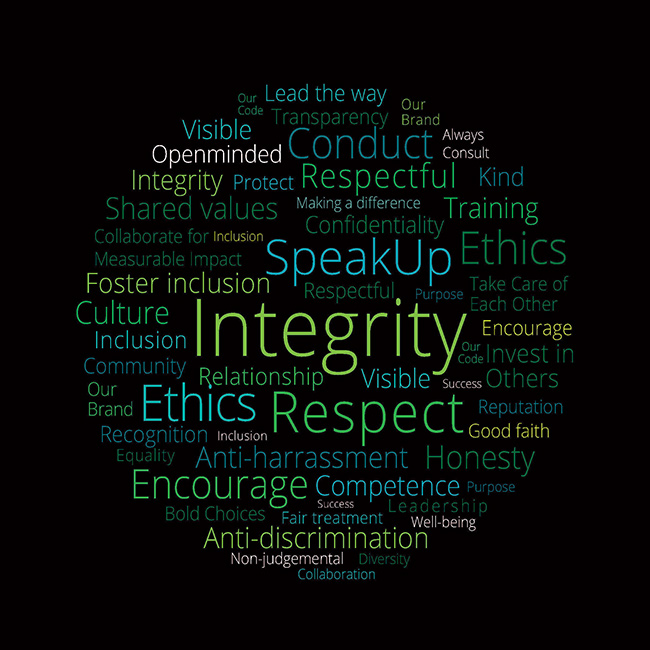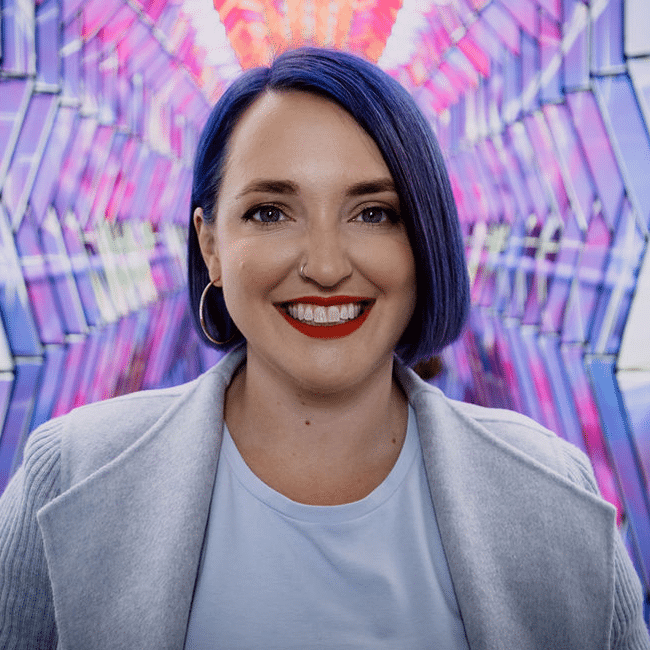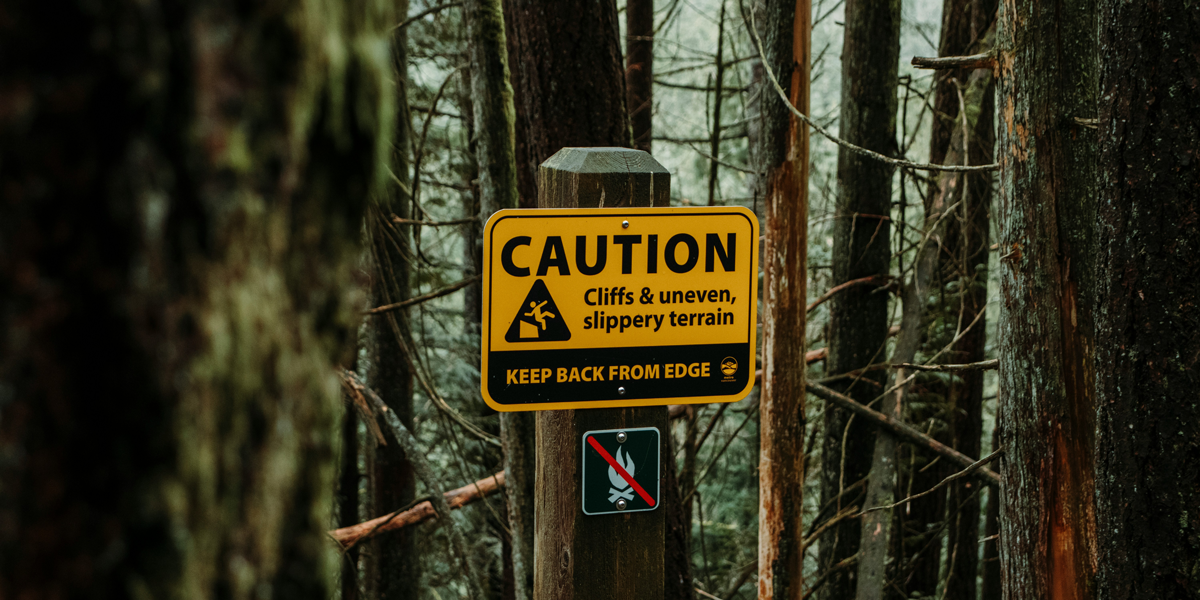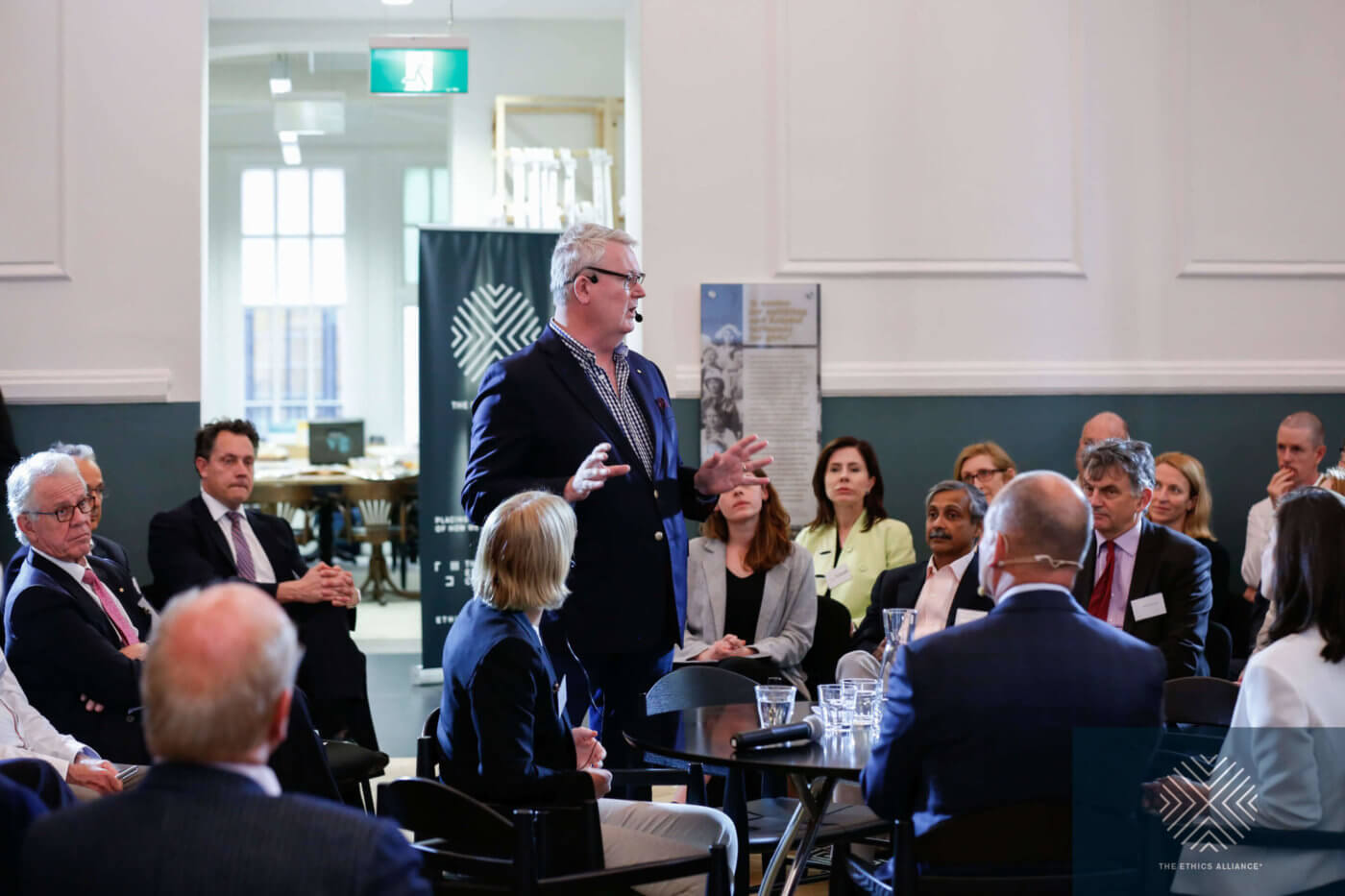How to improve your organisation’s ethical decision-making

How to improve your organisation’s ethical decision-making
Opinion + AnalysisBusiness + Leadership
BY The Ethics Centre 4 OCT 2022
Are you confident in your organisation’s ability to negotiate difficult ethical terrain? The Ethics Centre’s Decision Lab is a robust process that can help expand your ethical decision-making capability.
Imagine you run a not-for-profit that helps people experiencing problem gambling. You are approached by a high-net-worth individual connected to the gambling industry who is interested in making a substantial donation to your organisation. Funding is always hard to come by and you know you could reach many more people in need with this money. Do you accept the donation?
Or imagine you are the CEO of a publicly listed consulting firm that is deciding whether to take on a new client in the fossil fuel industry. You suspect it would be unpopular with younger members of your staff and some of your other clients, but it’s a very lucrative contract and it would significantly boost your bottom line ahead of reporting season. Do you take on the client?
What if you sat on the board of a major corporation that is planning to make a public statement urging the government to adopt a new progressive social policy. The proposed policy does not impact your business directly, but a majority of your staff support it. However, you personally have misgivings about the policy and suspect some other employees do as well. Do you put your name on the public statement?
What would you do in each of these situations? If you do have an answer, could you explain how you arrived at your decision? Could you defend it in public? Could you defend it on the front page of the newspaper?
Dealing with ethically-charged situations like these is never easy. Not only do our decisions have a material impact on multiple stakeholders, but we also need to be able to communicate and justify them. This is complicated by the fact that many of the influences on our ethical decision-making are implicit, meaning we risk making decisions based on unexamined values or we might struggle to explain how we arrived at a particular conclusion.
This is why The Ethics Centre has developed Decision Lab, a comprehensive ethical decision-making toolkit that surfaces the implicit elements in ethical decision-making and provides a robust process to navigate the ethical dimensions of critical decisions for organisations big and small.
Decision Lab
The Decision Lab process begins by clarifying the organisation’s core purpose, values and principles. The purpose includes the organisation’s overall mission, which is what it is aiming to achieve, and its vision, which is what the world looks like when it has achieved it. The values are what the organisation believes to be good and the principles are the guiderails that guide decision-making.
Even organisations that have published mission statements and codes of conduct will find that employees will have different understandings of purpose, values and principles, and these differences can influence ethical decision-making in a profound way. By bringing these perspectives to the surface, the Decision Lab process enables the diversity to be recognised and engaged with constructively rather than leaving it implicit and having different individuals pulling in different directions.
The Decision Lab also explores the process of decision-making, testing critical assumptions and taking multiple perspectives into account to ensure no key elements are overlooked. Take the hypothetical above about the not-for-profit. It would be easy to focus on the issue of whether it is hypocritical to accept money from those associated with gambling in order to fight problem gambling. But it is also crucial to consider the impact on other stakeholders, such as the beneficiaries of the not-for-profit’s services, their families and communities, or consider whether the perception of hypocrisy might affect future fundraising.
Shadow values
The process also acknowledges common biases and influences that can derail decision-making. A common one is the organisation’s Shadow Values which are the hidden uncodified norms and expectations promoted often out of awareness that can influence how the entire organisation operates. For example, many organisations explicitly subscribe to values such as integrity, but the shadow values might promote loyalty, which could prevent an employee from calling out a senior manager who is misrepresenting the work being done for a client.
The Decision Lab then provides a checklist for decisions that can be used as a ‘no regrets test,’ ensuring that all relevant elements have been considered. For example, should the consulting firm reject the contract with the fossil fuel company, it could suffer a backlash from shareholders, who argue that the board has a responsibility to create value for shareholders within the law rather than pursue political agendas. The Decision Lab checklist would ensure that such eventualities are considered before the decision was made.
The decision-making process is then stress tested against a variety of hypothetical scenarios, such as those above, that are tailored to the organisation’s mission and circumstances. This allows participants to put ethical decision-making into practice, engage in constructive deliberation and learn how to evaluate options and develop implementation plans as a team.
On completion of the Decision Lab, The Ethics Centre provides a customised decision-making framework that is tailored to the organisation and its needs for future reference.
Open book
The Decision Lab is a powerful and practical tool for any organisation looking to improve its ethical decision-making. It also has other benefits, such as increases awareness of the lived organisational culture, including the beliefs, attitudes and practices shared amongst its people. It identifies how the current culture and systems are enabling or constraining the realisation of the organisation’s goals.
By unifying employees around a common purpose and encouraging values-aligned behaviour, it ensures that the entire organisation is working as a unit towards a shared vision. The deliberative process also helps to build a climate of trust within the organisation, which aids in avoiding and resolving conflicts, as well as promoting good decision-making.
Individuals and organisations are constantly making decisions that have wide-reaching impacts. The question is: are you doing it well? The Decision Lab can ensure that your organisation’s decision-making is done in an open, robust and constructive manner, producing more ethical decisions and contributing to a positive work culture.
The Ethics Centre is a thought leader in assessing organisational cultural health and building leadership capability to make good ethical decisions. To arrange a confidential conversation contact the team at consulting@ethics.org.au. Or visit our consulting page to learn more.
Ethics in your inbox.
Get the latest inspiration, intelligence, events & more.
By signing up you agree to our privacy policy
You might be interested in…
Opinion + Analysis
Business + Leadership
Perils of an unforgiving workplace
Opinion + Analysis
Business + Leadership
Georg Kell on climate and misinformation
Opinion + Analysis
Business + Leadership
What are millennials looking for at work?
Reports
Business + Leadership
The Ethical Advantage
BY The Ethics Centre
The Ethics Centre is a not-for-profit organisation developing innovative programs, services and experiences, designed to bring ethics to the centre of professional and personal life.
Big tech knows too much about us. Here’s why Australia is in the perfect position to change that

Big tech knows too much about us. Here’s why Australia is in the perfect position to change that
Opinion + AnalysisBusiness + LeadershipScience + Technology
BY The Ethics Alliance Emma Elsworthy 30 SEP 2022
Consumer Rights Data will bring an era of “commercial morality”, experts say.
Who are you? The question springs to mind a list of identity pillars – gender, job title, city, political leaning or perhaps a zany descriptor like “caffeine enthusiast!”. But who does big tech think you are?
Most of the time, we live in digital ignorance of the depth of data being scraped from everything from our Google searches to our Apple Pay purchases. Occasionally, however, we become only too aware of our own surveillance – looking at cute dog videos, for instance, and suddenly seeing ads for designer dog leashes in our Facebook feed.
It gets darker. In the wake of the US rolling back abortion law Roe v Wade, American women were discouraged from tracking their periods using an app on their smartphones. Big tech, pundits warn, could know when you’re pregnant – or more chillingly, whether you remained so.
In July, a report from Australian-US cybersecurity firm Internet 2.0 found popular youth-focused social media app TikTok could see user contact lists, access calendars, scan hard drives (including external ones) and geolocate our phones – and therefore us – on an hourly basis.
It’s “overly intrusive” data harvesting, the report found, considering “the application can and will run successfully without any of this data being gathered”.
Android users are far more exposed than Apple users because iOS significantly limits what information an app can gather. Apple has what is known as a “justification system”, meaning if an app developer wants access to something, it has to justify the requirement before Apple will permit it.
Should we be worried about TikTok’s access to our inner lives? With simmering geotensions between Australia and China – perhaps. The app is owned by ByteDance, a Beijing-based internet company, and the report found that “Chinese authorities can actually access device data”.
Professor of Business Information Systems at the University of Sydney Uri Gal writes that “TikTok’s data can also be used to compile detailed user profiles of Australians at scale”.
“Given its large and young Australian user base, it is quite likely that our country’s future prime minister and cabinet members are being surveilled and profiled by China,” he warned.
Australia is in a strong position to take action on the better protection of consumer data. Our world-leading Consumer Data Right (CDR) is being rolled out across Australia’s banking, energy and telecommunication sectors, placing the right to know about us back into our own hands.
Could our consumer rights expand beyond privacy rights to include specific economic rights too? Almost certainly, under CDR.
For instance, energy consumers would no longer have to wade through confusing fine print to work out whether they’re getting the best (and cheapest) electricity deal – with a click of a button they’d have their energy usage data sent to a new potential supplier, and the supplier would come back with a comparison.
That means no endless forms of information required upfront by a new provider, no lengthy phone calls spent cancelling one’s current provider, and crucially, no last-minute left-field discounts from a provider to keep you as a customer.
“Within five years, it should have transformed commerce, promoted competition in many sectors, and simplified daily life,” according to The University of NSW’s Ross P Buckley and Natalia Jevglevskaja.
“Thirty years ago, most Australian businesses thought charging current customers more than new customers was unfair and the law reflected this – such differential pricing was illegal,” the pair continued.
“Today those standards of behaviour seem to have fallen away and this is reflected in more relaxed consumer laws. In many contexts, CDR should reinstitute a commercial morality, a basic fairness, that modern business practices have set aside.”
A rethink of what it means to operate with transparency is what motivates fintech Flare, which aims at transforming the way Australians earn and engage in the workplace with superannuation, banking, and HR services.
Flare’s Head of Strategy Harry Godber was actually one of the original architects of CDR’s launch, which took place during his time in government as a former senior government advisor to Liberal prime ministers Malcolm Turnbull and Scott Morrison.
“[CDR] is designed to get rid of those barriers, get rid of the information asymmetry and allow you to have as much information about your banking products as someone else in the market as your bank has about you,” Godber said.
It’s a great equaliser, he continues, in that data will no longer separate the “haves and the have-nots” in the consumer world – essentially, financial literacy won’t ensure a consumer gets a better deal on products.
“That is a huge step forward when it comes to distributing financial products in an ethical way,” he continued.
“Because essentially it means if all data is equal, if everybody has access to every financial institution’s open product data and knows exactly how they will be treated then acquiring a customer suddenly becomes a matter of having good products, and very little else.”
Ethics in your inbox.
Get the latest inspiration, intelligence, events & more.
By signing up you agree to our privacy policy
You might be interested in…
Reports
Business + Leadership
Thought Leadership: Ethics at Work, a 2018 Survey of Employees
Opinion + Analysis
Business + Leadership
The invisible middle: why middle managers aren’t represented
Opinion + Analysis
Business + Leadership
The dangers of being overworked and stressed out
Opinion + Analysis
Science + Technology, Health + Wellbeing
Does your therapy bot really care about you? The risks of offloading emotional work to machines
BY The Ethics Alliance
The Ethics Alliance is a community of organisations sharing insights and learning together, to find a better way of doing business. The Alliance is an initiative of The Ethics Centre.
BY Emma Elsworthy
Before joining Crikey in 2021 as a journalist and newsletter editor, Emma was a breaking news reporter in the ABC’s Sydney newsroom, a journalist for BBC Australia, and a journalist within Fairfax Media’s regional network. She was part of a team awarded a Walkley for coverage of the 2019-2020 bushfire crisis, and won the Australian Press Council prize in 2013.
Why fairness is integral to tax policy

Why fairness is integral to tax policy
Opinion + AnalysisBusiness + LeadershipPolitics + Human Rights
BY Joshua Pearl 22 AUG 2022
Pick up a first-year undergraduate economics textbook on tax and you’ll likely be apprised that there are three desired features of a tax policy: simplicity, efficiency and fairness.
The importance of the first two are somewhat obvious. Simplicity, because taxpayers need to understand how to comply with the tax system. Efficiency, because if people can easily change their behaviour to avoid paying tax, there won’t be much revenue to fund government expenditure. But fairness, the third desired feature of tax policy, is more nebulous.
Tax fairness is important not merely because economists tell us so. Rather, Australia needs to consider tax fairness for reasons such as: ensuring the continued political legitimacy of the Australian governments; because tax inherently deals with issues of inequality; and for the very practical reason of helping us deliver tax system reform.
In a liberal country such as Australia, a well-accepted norm is that restrictions on individual freedom must be justified. And in liberal philosophy, the dominate way to justify government restrictions is by considering a “public reason” test, well-articulated by influential twentieth century philosopher John Rawls’ liberal principle of legitimacy:
“Political power is legitimate only when it is exercised in accordance with a constitution (written or unwritten) the essentials of which all citizens, as reasonable and rational, can endorse in the light of their common human reason”.
Restrictions that are arbitrary, unfair, exploitative or focus on benefitting a few at the expense of the many, undermine political legitimacy because they cannot be justified. Prohibiting the Nazi swastika might be justifiable because people have a right not to be vilified or feel physically threatened. But prohibiting tattoos or facial piercings, dress wear, beach outfits or more sinisterly, citizenship based on skin colour, because they offend certain sensibilities, are not legitimate forms of government coercion because they cannot be reasonably justified using the public reason test.
Rawls considered the public reason test would apply to areas in the public domain relating to judges, government officials, and politicians. And the public reason test applies to taxation as much as any other act of government coercion. Taxation, the compulsory, unrequited payment to government, is quite literally nothing, if it is not coercive. In Australia we pay around $600bn in tax each year, over $40,000 per working person.
If the tax system is unfair, it cannot be justified. And taxation that is unjustified etches away at the political legitimacy of the Australian government and, in turn, Australian democracy.
The two primary functions of tax are:
1. to fund public goods such as military, transport, education, police and the judiciary
2. to redistribute wealth and income, through policies such as pension payments, unemployment payments, childcare and paid parental leave. Therefore, because tax impacts wealth and income distribution, as well as economic inequality, the tax system has inherent fairness implications.
Wealth and income distribution, the second function of tax, determines economic inequality, an inherent fairness issue. And to determine the required tax level requires consideration of the level of wealth and income inequality we consider fair. It might be said this issue is more relevant today than in other times in our recent history; Australian inequality measures have increased steadily since the 1980s. But even if we consider current wealth and income inequality levels as acceptable, presumably there is a limit. It is unlikely that Australia would still be considered a fair country if we were a nation of 20 billionaires and twenty million paupers.
One might be tempted to try and decouple tax issues from fairness issues by claiming Australia and our tax system is fair so long as we have equality of opportunity; instead of worrying about wealth inequality and tax, we should focus on realising Australian cultural values such as a “fair go”, a value synonymous (according to the citizenship tests new citizens take) with “equality of opportunity”.
However, a “fair go” isn’t free. For a rich child and a poor child to have the same opportunities with respect to education, learning and a successful career, we require tax. For equality of opportunity to exist, the rich parent needs to contribute more tax to fund our education institutions than what the poor parent can afford. Here, issues of tax and fairness are bound.
A less philosophical reason as to why it’s important for Australia to consider tax system fairness relates to tax reform. The consensus among economists is the Australian tax system is uncompetitive, inefficient, too complex and out of date. And they may have a point.
Australia hasn’t had meaningful tax reform for decades and is out of step with international best practice. The Federal Government deficit is large and growing, thanks in part to the former government’s COVID-19 splurges (some necessary, some arguably less so). And Australian government debt is forecast to reach a trillion dollars in the coming years, a level that may limit or preclude policy responses to future wars, pandemics, financial crises or property market crashes (and the implications of muted policy options is not merely no pink batts or no JobKeeper in time of catastrophe, but no jobs, high unemployment and potential social unrest).
Yet despite the arguments of a host of economic experts, such as ANU’s Professor Robert Breunig the former Federal Treasury head Dr. Ken Henry, OECD and IMF mandarins, to name but a few, the Australian tax system remains as it is. While tax reform by its nature is challenging (there is always a loser – someone will be paying more), it’s hard not to think the focus on tax efficiency, tax competitiveness, tax complexity and so on and so forth, has failed to create the “burning platform” needed to drive policy change. A greater focus on the fairness of the Australian tax system may be what is required to buttress the valid but sometimes technical economic arguments for Australian tax system reform.
Considering fairness of the tax system is important for political legitimacy, inequality and practical reasons. A tax system that is fair strengthens our democracy by ensuring taxation remains justifiable. Tax fairness helps us realise Australian cultural values such as equality of opportunity. And a greater focus on tax fairness might help us undertake meaningful tax reform, delivering a tax system that is simple, efficient and fair.
Ethics in your inbox.
Get the latest inspiration, intelligence, events & more.
By signing up you agree to our privacy policy
You might be interested in…
Opinion + Analysis
Business + Leadership, Relationships
Treating citizens as customers is a recipe for distrust
Opinion + Analysis
Politics + Human Rights
Orphanage ‘voluntourism’ makes school students complicit in abuse
Opinion + Analysis
Climate + Environment, Politics + Human Rights
Are we idolising youth? Recommended reads
Opinion + Analysis
Politics + Human Rights, Relationships
To deal with this crisis, we need to talk about ethics, not economics
BY Joshua Pearl
Joshua Pearl is the head of Energy Transition at Iberdrola Australia. Josh has previously worked in government and political and corporate advisory. Josh studied economics and finance at the University of New South Wales and philosophy and economics at the London School of Economics.
Finance businesses need to start using AI. But it must be done ethically

Finance businesses need to start using AI. But it must be done ethically
Opinion + AnalysisBusiness + LeadershipScience + Technology
BY The Ethics Centre 2 AUG 2022
Banking and finance businesses can’t afford to ignore the streamlining and cost reduction benefits offered by Artificial Intelligence (AI).
Your business can’t effectively beat the competition marketing any product in the 21st century without using big data and AI. Given the immense amount of consumer data available – and the number of channels, segments and competitors – marketers need to use AI and algorithms to operate successfully in the online environment.
But AI must be used prudently. Business managers must be meticulous in setting up rules for the algorithms’ decision making to prevent AI, which lacks a human’s inherent moral and ethical guiding force, from targeting ads towards unsuitable or vulnerable customers, or making decisions that exacerbate entrenched racial, gender, age, socio-economic, or other disparities and prejudices.
The Banking and Finance Oath’s 2021 Young Ambassadors recognised a gap in the research and delivered report: AI driven marketing in financial services: ethical risks and opportunities. It unravels the complexities of AI’s impact across the financial services industry and government, and establishes a framework that can be applied to other contexts.
In a marketing environment, AI can be used to streamline processes by generating personalised content for customers or targeting them with individual offers; leveraging customers’ data to personalise web and app pages based on their interests; enhancing customer service with chatbots; and supporting a seamless purchasing journey from phone to PC to in-person at a storefront.
Machine learning algorithms draw from immense data pools, such as customers’ credit card transactions and social media click-throughs to predict the likelihood of customers being interested in a product, whether to show them an ad and what ad to show them. But there are ethical risks to navigate at every step – from the quality of the data used to how well the developers and business managers understand the business objectives.
Using AI for marketing in financial services comes with two significant risks. The first is the potential for organisations to be seen as preying on people in vulnerable circumstances.
AI has no moral oversight or human awareness – it simply crunches the numbers and makes the most advantageous and profitable decision to lead to a sales conversion.
And if that decision is to target home loan ads at people going through a divorce or a loved one’s funeral, or to target credit card ads at people who are unemployed or living with addiction, without proper oversight, there’s nothing to stop it.
The other risk is the potential for data misuse and threats to privacy. Customers have a right to their own data and to know how it’s being used – and what demographics they’re being placed in. If your data’s out of date or inaccurate, or missing in sections, you’ll be targeting the wrong people.
All demographics – including racial background, socio-economic status, and individual psychological profile – have the potential to be misused by AI to reinforce gender, racial, age, economic and other disparities and prejudices.
Most ethical failings in AI-driven marketing campaigns can be traced back to issues with governance – poor management of data and lack of communication between developers and business managers. These data governance issues include: siloed databases that don’t share definitions; datasets that don’t refresh quickly enough and become outdated; customer flags that are incorrect or missing; and too many people being designated as data owners, resulting in the deferral of responsibility.
In human driven decision making, there’s a clear line of command, from the Board, to management, to the frontline team. But in AI-driven decision making, the frontline team is replaced by two teams – the AI developers and the team of machines.
Communication gaps emerge where management may not be familiar with instructing AI developers and the field’s highly technical nature, and the developers may not be familiar with the jargon of the business. Training across the business can act to fill these gaps.
Before any business begins to integrate AI into its marketing (and overall) strategy, it’s crucial that it adopt a set of basic ethical principles, these being:
- Beneficence (or do good): personalise products to improve the customer’s experience and improve their financial literacy by delivering targeted advice.
- Non-maleficence (or do no harm): ensure your AI marketing doesn’t target customers in inappropriate or harmful ways.
- Justice: ensure your data doesn’t discriminate based on demographics and exacerbate racial, gender, age, socio-economic or other disparities or stereotypes.
- Explicability: you need to be able to explain how your AI system makes the decisions it does and the relation between its inputs and outputs. Experts should be able to understand its results, predictions, recommendations and classifications.
- Autonomy: at the company level, governance processes should keep humans informed of what’s happening; and at a customer level, responsible decision making should be supported through personalisation and recommendation tools.
The reality is that no business can afford to ignore the benefits AI offers, but the risks are very real. By acknowledging the ethical issues, businesses can seize the opportunities while mitigating the risks, benefiting themselves and their customers.
Download a copy of the report here.
Ethics in your inbox.
Get the latest inspiration, intelligence, events & more.
By signing up you agree to our privacy policy
You might be interested in…
Opinion + Analysis
Science + Technology
Bladerunner, Westworld and sexbot suffering
Opinion + Analysis
Business + Leadership, Science + Technology
Meet Aubrey Blanche: Shaping the future of responsible leadership
Opinion + Analysis
Business + Leadership
Despite codes of conduct, unethical behaviour happens: why bother?
Opinion + Analysis
Business + Leadership, Health + Wellbeing, Society + Culture
Corruption in sport: From the playing field to the field of ethics
BY The Ethics Centre
The Ethics Centre is a not-for-profit organisation developing innovative programs, services and experiences, designed to bring ethics to the centre of professional and personal life.
Who does work make you? Severance and the etiquette of labour

Who does work make you? Severance and the etiquette of labour
Opinion + AnalysisBusiness + LeadershipRelationshipsScience + TechnologySociety + Culture
BY Joseph Earp 1 AUG 2022
There are certain things that some of us choose and do not choose, to tell those who we work with.
You come in on a Monday, and you stand around the coffee machine (the modern-day equivalent of the water cooler), and somebody asks you: “so, what did you get up to this weekend?”
Then you have a choice. If you fought with your partner, do you tell your colleague that? If you had sex, do you tell them that? If your mother is sick, or you’re dealing with a stress that society has broadly considered “intimate” to reveal, do you say something? And if you do, do you change the nature of the work relationship? Do you, in a phrase, “freak people out?”
These social conditions – norms, established and maintained by systems – are not specific to work, of course. Most spaces that we enter into and share with other people have an implicit code of conduct. We learn these codes as children – usually by breaking the rules of the codes, and then being corrected. And then, for the rest of our lives, we maintain these codes, often without explicitly realising what we are doing.
There are things you don’t say at church. There are things you do say in a therapist’s office. This is a version of what is called, in the world of politics, the “Overton Window”, a term used to describe the range of ideas that are considered “normal” or “acceptable” to be discussed publicly.
These social conditions are formed by us, and are entirely contingent – we could collectively decide to change them if we wanted to. But usually – at most workplaces, importantly not all – we don’t. Moreover, these conditions go past certain other considerations, about, say honesty. It doesn’t matter that some of us spend more time around our colleagues than those we call our partners. This decision about what to withhold in the office is frequently described as a choice about “professionalism”, which is usually a code word for “politeness.”
Severance, the new Apple television show which has been met with broad critical acclaim, takes the way that these concepts of professionalism and politeness shape us to its natural endpoint. The sci-fi show depicts an office, Lumon Industries, where employees are implanted with a chip that creates “innie” and “outie” selves.
Their innie self is their work self – the one who moves through the office building, and engages in the shadowy and disreputable jobs required by their employer. Their outie self is who they are when they leave the office doors. These two selves do not have any contact with, or knowledge of each other. They could be, for all intents and purposes, strangers, even though they are – on at least one reading – the “same person.”
The chip is thus a signifier for a contingent code of social practices. It takes something that is implicit in most workplaces, and makes it explicit. We might not consider it a “big deal” when we don’t tell Roy from accounts that, moments before we walked in the front door of the office, we had a massive blow-up over the phone with our partner. Which may help Roy understand why we are so ‘tetchy’ this morning. But it is, in some ways, a practice that shapes who we are.

According to the social practices of most businesses, it is “professional” – as in “polite” – not to, say, sob openly at one’s desk. But what if we want to sob? When we choose not to, we are being shaped into a very particular kind of thing, by a very particular form of etiquette which is tied explicitly to labor.
And because these forms of etiquette shape who we are, they also shapes what we know. This is the line pushed by Miranda Fricker, the leading feminist philosopher and pioneer in the field of social epistemology – the study of how we are constructed socially, and how that feeds into how we understand and process the world.
For Fricker, social forces alter the knowledge that we have access to. Fricker is thinking, in particular, about how being a woman, or a man, or a non-binary person, changes the words we have access to in order to explain ourselves, and thus how we understand things. That access is shaped by how we are socially built, and when we are blocked from access, we develop epistemic blindspots that we are often not even aware that we have.
In Severance, these social forces that bar access are the forces of capitalism. And these forces make the lives of the characters swamped with blindspots. Mark, the show’s hero, has two sides – his innie, and his outie. Things that the innie Mark does hurt and frustrate the desires of the outie Mark.
Both versions of him have such significant blindspots, that these “separate” characters are actively at odds. Much of the show’s first few episodes see these two separate versions of the same person having to fight, and challenge one another, with Mark striving for victory over outie Mark.

The forces of etiquette are always for the benefit of those in power. We, the workers at certain organisations, might maintain them, but their end result is that they meaningfully commodify us – make us into streamlined, more effective and efficient workers.
So many of us have worked a job that has asked us to sacrifice, or shape and change certain parts of ourselves, so as to be more “professional”. Which is a way of saying that these jobs have turned us into vessels for labour – emphasised the parts of us that increase productivity, and snipped off the parts that do not.
The employees of Lumon live sad, confused lives full of pain, riddled with hallucinations. The benefit of the code of etiquette is never to them. They get paid, sure. But they spend their time hurting each other, or attempting suicide, or losing their minds. Their titular severance helps the company, never them.
This is what the theorist Mark Fisher refers to when he writes about the work of Franz Kafka, one of our greatest writers when it comes to the way that politeness is weaponised against the vulnerable and the marginalized. As Fisher points out, Kafka’s work examines a world in which the powerful can manipulate those that they rule and control through the establishment of social conduct; polite and impolite; nice and not nice.
Thus, when the worker does something that fights back against their having become a vessel for labour, the worker can be “shamed”, the structure of etiquette used against them. This happens all the time in the world of Severance. As the season progresses, and the characters get involved in complex plots that involve both their innie and outie selves, the threat is always that the code of conduct will be weaponised against them, in a way that further strips down their personality; turns them into more of a vessel.
And, as Fisher again points out, because these systems of etiquette are for the benefit of the powerful, the powerful are “unembarrassable.” Because they are powerful – because they are the employer – whatever they do is “right” and “correct” and “polite.” Again, the rules of the game are contingent, which means that they are flexible. This is what makes them so dangerous. They can be rewritten underneath our feet, to the benefit of those in charge.
Moreover, in the world of the show, the characters “choose” to strip themselves of agency and autonomy, because of the dangling carrot of profit. This sharpens the satirical edge of Severance. It’s not just that the snaking rules of the game that we talk about when we talk about “good manners” make them different people. It’s that the characters of the show submit to these rules. They themselves maintain them.
Nobody’s being “forced”, in the traditional sense of that word, into becoming vessels for labour. This is not the picture of worker in chains. They are “choosing” to take the chip, and to work for Lumon. But are they truly free? What is the other alternative? Poverty? And what, actually, makes Lumon so different? A swathe of companies have these rules of etiquette. Which means a swathe of companies do precisely the same thing.
This is a depressing thought. But the freedom from this punishment lies, as it usually does, in the concept of contingency. Etiquette enforces itself; it punishes, through social isolation and exclusion, those who break its rules.
But these rules are not written on a stone tablet. And the people who are maintaining them are, in fact, all of us. Which means that we can change them. We can be “unprofessional.” We can be “impolite”. We can ignore the person who wants to alter our behaviour by telling us that we are “being rude.” And in doing so, we can fight back against the forces that want to make us one kind of vessel. And we can become whatever we’d like to be.
Ethics in your inbox.
Get the latest inspiration, intelligence, events & more.
By signing up you agree to our privacy policy
You might be interested in…
WATCH
Relationships
Unconscious bias
Opinion + Analysis
Relationships, Society + Culture
Meet Daniel, helping us take ethics to the next generation
Opinion + Analysis
Science + Technology
The “good enough” ethical setting for self-driving cars
Explainer, READ
Business + Leadership
Ethics Explainer: Moral hazards
BY Joseph Earp
Joseph Earp is a poet, journalist and philosophy student. He is currently undertaking his PhD at the University of Sydney, studying the work of David Hume.
Is debt learnt behaviour?

Debt means different things to different people. While some are confident to juggle huge amounts of debt spread across a few credit cards, others start hyperventilating at the mere notion of paying a bill a day late.
Debt is also intrinsically linked to our emotional state of mind. Purchasing a new outfit using Buy now, pay later services might trigger an immediate dopamine hit, and leave the trouble of those four pesky payments to a future version of yourself. Or on the larger scale, buying an apartment means taking on the biggest debt most will take on in their lifetime, but it marks a momentous life milestone.
Why is debt so emotional? And what hidden psychological forces shape our attitudes and relationships towards it?
Keep it in the family
Our attitudes towards debt are largely inherited from our family, according to Jess Brady, a financial advisor at Fox and Hare Financial and founder of online community Ladies Talk Money. Brady says debt is not just numbers on a spreadsheet, but rather a complex emotional relationship informed by how we saw our families and friends interact with their finances when we were kids. “It might be shaped by parents separating and having to move from middle class life, to potentially a period where things became really tight from a monetary perspective. And so now, fear and insecurity drive decision making in your money, beliefs or behaviour.”
“It might be that you watched your parents make reckless decisions, which has made you quite fearful about making any decisions. Or quite the opposite that you’re used to having a lot of money and a lot of freedom. Meaning that you spend money without really considering what the consequences are so often it is what we did or didn’t see in a home life environment.”
What’s clear is, there’s no rulebook when it comes to debt and financial management. Whether you’ve grown up with examples of responsible spending or not, the moment you get your first job and your own bank account – you’re on your own, which is why Brady thinks it’s important to supercharge your financial literacy.
“We wrap so much shame and guilt around debt.” If we’re going to start normalising talking about money, then the lessons of accepting and reflecting on the decision-making that got you to this point are valuable.
Jess Brady’s key financial messages for getting ahead of debt and improving financial literacy are:
- Stop identifying as someone who is, “bad with money”: this negative self-talk creates a belief system around excusing bad behaviour.
- The buck stops with you: don’t offload large financial decisions onto others whether that be a partner or a parent.
- Working 9-5: Take responsibility for your own income and embrace the mantra “I decide where and how to spend my own money.”
It’s all about the sell
For some, accumulating debt can feel like sacrificing freedom while for others it’s exactly the opposite. For a lot of people debt is an opportunity, it’s the promise of more, being one step closer to your dreams. Our differing perceptions of taking on debt has a lot to do with how it is marketed.
Taking on debt to go to university, to buy a car or an apartment are all seen as responsible debt associated with big life milestones, but debt is no longer just about buying your dream home, or taking out a credit card for the frequent flyer points. It’s about wanting a new pair of shoes… And thanks to Buy now, pay later services, getting them immediately.
According to Adam Ferrier, a behavioural psychologist and co-founder of Sydney based advertising agency, Thinkerbell, money is marketed with a sledgehammer. “Money used to be marketed by a promise of aspiration. But it feels like that aspirational side of money has been chipped away at, and it’s almost a bit gauche to promise an aspirational lifestyle with money. Debt in this country is marketed very much as an issue and something that you have to get out of and create a sense of urgency, often targeting the less financially literate people in the marketplace.”
But all debt was not created equal, and it’s the rise of Buy now, pay later type debts amongst the younger generations that have a number of financial advisors and writers concerned. According to Jonathan Shapiro, journalist and author of Buy now pay later, the extraordinary story of Afterpay, these services didn’t exactly set out to be unethical. “I think what’s happened is that we convinced ourselves that they are providing some sort of a win-win solution and they are of the belief that something so good and so popular cannot be bad.”
The introduction of companies like Afterpay to the financial lending market means it’s never been easier to fall into the red. And because of the clever way they’re marketed as payment services rather than lenders means they have largely dodged regulation, leading to heavy ethical scrutiny.
“A lot of its success is built around a behavioural hack. If something is $100, it might intimidate a consumer. But if it’s leading to $25 payments over six weeks, it makes it more palatable.”
The dangers of these services are that consumers will spend way more than they had originally intended because when a large price tag is divided over the span of six weeks it feels more manageable. “It’s put the burden on consumer groups to educate themselves. Those who use Afterpay need to be mindful of the risks of booting up a debt trap. Now they might not fall into a debt trap in the same way someone using a credit card might. But what tends to happen is Buy now, pay later users that have overextended themselves sign up for a myriad of other providers, or they stop paying other bills that are more important.”
What’s important is that we begin to normalise conversations about money, about investments, and about debt. We’re living in a time where the way debt is marketed is shifting dramatically, so it’s imperative to improve our financial literacy because our critical thinking skills and understanding what’s right for us has never felt more important.
Life and Debt is available to listen to on Spotify and Apple Podcasts.
This podcast is a project from the Young Ambassadors in The Ethics Centre’s Banking and Finance Oath initiative. Our work is made possible by donations including the generous support of Ecstra Foundation – helping to build the financial wellbeing of Australians.
Ethics in your inbox.
Get the latest inspiration, intelligence, events & more.
By signing up you agree to our privacy policy
You might be interested in…
Opinion + Analysis
Business + Leadership
Ethics of making money from JobKeeper
Opinion + Analysis
Business + Leadership
The Ethics Alliance: Why now?
Opinion + Analysis
Business + Leadership, Society + Culture
The Ethics Institute: Helping Australia realise its full potential
Opinion + Analysis
Business + Leadership, Health + Wellbeing, Relationships
Moving on from the pandemic means letting go
BY The Ethics Centre
The Ethics Centre is a not-for-profit organisation developing innovative programs, services and experiences, designed to bring ethics to the centre of professional and personal life.
Money talks: The case for wage transparency

Money talks: The case for wage transparency
Opinion + AnalysisBusiness + Leadership
BY Jack Derwin 30 JUN 2022
Sex, death, politics, money. No matter how much some things change, some taboos stubbornly live on. But when it comes to the matter of wages, our silence on the subject is only hurting ourselves.
As we’ve discussed, radical transparency – when implemented with care – can help build trust and accountability. This openness not only assists in identifying where we stand but also in charting the necessary path forward.
Yet while the public conversation around wage inequality has never been louder, we remain remarkably tight-lipped on the topic of pay. Opening up a dialogue about our salaries may just be the first step to putting us all on equal footing.
A raw deal
While workplace discrimination exists in many forms, the gender pay gap has become the most identifiable indicator of its prevalence in the workplace.
Right now in Australia women are paid nearly 14% less than men, according to government data – slightly above the average recorded across other OECD nations. While over time the difference is narrowing, progress is predictably slow across the developed world.
This may partly be attributed to a lack of accountability among some businesses. During this year’s International Women’s Day (IWD) for example, the rhetoric of British businesses was challenged by a Twitter bot programmed specifically for the occasion.
Any tweet celebrating IWD from an official corporate account was met with an automated response, publishing the official pay gap at that specific company. The difference – often a percentage in the double digits– painted a bleak view of the current state of affairs.
But more importantly, the stunt quantified the issue at an organisational level and provided a useful reminder: by measuring the problem, we can manage it. By bringing public attention to specific cases, the bot held workplaces accountable on a case by case basis and drew a line in the sand.
Indeed, employment experts suggest this kind of open wage dialogue could be an important weapon in fighting wage inequality. Government research highlights that within Australian organisations where there is wage transparency, the gender gap is narrowing by 3.3% per year. While this may be due to many factors, transparency is at least helpful in tracking improvement over time.
Hush money
The argument for greater openness is increasingly being recognised. Last year in Australia, the then Federal Opposition proposed outlawing pay secrecy clauses which explicitly prevent colleagues from discussing their pay packets.
In the financial services sector, clauses have historically been commonplace with one study estimating women at Australia’s largest bank are collectively being paid $500 million less than their male peers. The industry union has used such figures to rally for greater transparency and amid several industrial cases in which employees were actually dismissed for disclosing their pay.
The campaign has worked. Australia’s big four banks – ANZ, NAB, Westpac and the Commonwealth Bank – all recently scrapped their privacy clauses. Staff can now choose to discuss their pay packets should they wish without fear of facing retribution from their employer. Given the four organisations employ more than 160,000 Australians between them, it’s no small achievement.
Global view
Many countries around the world, including the United States and United Kingdom, have already nullified these provisions and have been clear in justifying why. The executive order from the Obama administration doing so in 2014 for example linked them to employer discrimination and market inefficiency.
But governments are also taking additional steps to proactively open up the conversation around remuneration. Many, including the UK, now require publicly-listed companies and other employers to publish the average pay ratio between CEO and worker.
Similar laws in Australia, in operation since 2012, explicitly do so on the basis of closing the gender wage gap. In fact, around half of all OECD nations have comparable mandates.
Germany has gone one step further. Female workers can not only find out how much their male colleagues are making but are now also permitted to demand the median wage of a group doing the same job.
Notably, some corporations are even using transparency to attract talent in an extremely tight labour market. PWC became the first big consultancy firm in Australia to publish its own pay bands in a bid to find the best people, although It’s worth pointing out the breadth of each band does little to specific pay per job.
More to be done
While greater transparency is helping to hold feet to the fire, it is clear that the initiatives described above are just a start.
A recent OECD report for example points out that we’re far from anything resembling ‘radical transparency’. While around half of the 38 member nations publish company-wide figures, more can be done to turn information into meaningful action.
For example, at the moment only a limited number of companies are required to report any pay data at all, with most countries drawing the line at large publicly-listed entities. So too is the pay data these organisations provide often limited in nature.
Annual auditing of the information published and a strong independent regulator to oversee it are just two important future steps prescribed by the OECD. Any requirements need to be legally enforceable, it argues, and there needs to be penalties for those found flaunting the rules – as is already the case in Iceland.
Without these additional changes, workers aren’t actually in a better position to negotiate. Particularly when they come from groups that have historically been marginalised in the workplace. Instead it can mean they’re more acutely aware of their disadvantage with little practical means to address it.
The Norway Experiment
This conclusion is backed up by the experience of Norway, which has been trialling a form of radical transparency for years.
Norway’s tax office annually publishes every individual’s income on the public record. It also reveals the value of their assets and how much tax they paid. The idea is that in a country that leans socialist, trust must be maintained in the taxation system that supports it.
The experiment has largely been fruitful. Norway has a strong tradition of collective bargaining and a gender gap that is ranked third smallest in the world.
Naturally it’s difficult to conclude what came first: Norway’s relatively equal pay or the country’s unusual wage transparency. In all likelihood, these factors are mutually dependent.
However the Norwegian experiment also reveals the pitfalls of radical transparency and the natural threat it poses to personal privacy.
In 2001, the country digitised its records, making them instantly searchable from any personal computer. While records had been available for decades, this move eliminated the need to line up and leaf through the single book available in every municipality.
This digitalisation may have been a step too far. A study by the American Economic Association (AEC) found that the happiness of Norwegians actually became more correlated to their income level after 2001 by a factor of almost 30% – but only if that citizen had good internet access.
The hypothesis shared by the AEC is that those who could easily look up the incomes of their colleagues, friends and families, did so. Those who discovered their own incomes paled in comparison seem to have suffered emotionally because of it, even in the relatively equal nation of Norway.
In other words, the old axiom that ‘comparison is the thief of joy’ rings true. Significantly, in 2014, Norway made searches a matter of public record as well, making it known who had searched for your income. The volume of queries residents made on their neighbours fell immediately by 90% – making for presumably a far happier nation.
Lesson learned
The Norwegian experience paints a cautionary tale around the excesses of radical transparency. Specifically, it shows that wage data that is instantly available and that personally identifies individuals without their consent can do more harm than good. Careful protections will be required to ensure that workers are able to protect their own privacy.
More broadly, the examples suggest that information alone is not sufficient to prevent discrimination in the workplace. While it can serve as an important tool in bridging the gender wage gap for example, it needs to be carefully deployed along with other policies to measure progress, empower staff, and punish employers that deliberately mislead or discriminate.
Yet greater transparency clearly does have an important role to play. It helps keep workers informed of where they stand in relation to their colleagues. Making this kind of data public also makes sense that differences in pay need to be quantified before they can be rectified. Certainly, it helps enable countries to measure their progress to date and the effectiveness of their actions going forward.
Ultimately transparency is not a silver bullet, rather it is a means to an end. Properly informed and equally empowered, workers can finally begin to level the playing field.
Ethics in your inbox.
Get the latest inspiration, intelligence, events & more.
By signing up you agree to our privacy policy
You might be interested in…
Opinion + Analysis
Business + Leadership, Politics + Human Rights
Should corporate Australia have a voice?
Opinion + Analysis
Business + Leadership
Why the future is workless
Opinion + Analysis
Business + Leadership, Society + Culture
A new guide for SME’s to connect with purpose
Opinion + Analysis
Business + Leadership, Health + Wellbeing, Science + Technology
Can robots solve our aged care crisis?
BY Jack Derwin
Jack is a Sydney-based writer and journalist, specialising in business and economics. His reporting has appeared in the Sydney Morning Herald, the Australian Financial Review, Business Insider and the Asahi Shimbun among others.
It’s time to talk about life and debt

It’s time to talk about life and debt
Opinion + AnalysisBusiness + Leadership
BY The Ethics Centre 17 JUN 2022
It’s no secret that things are getting more expensive.
Over the last few months Google searches for “the cost of living” have increased by 10 fold, and it’s no surprise. The price of vegetables has increased by almost 30%, some used cars are up over 45%, petrol is at the highest rate in history, and a string of interest rate rises have hit for the first time in more than a decade. Millions of Australians are feeling the financial stress of keeping a roof over their head, keeping the lights on and putting food on the table. So what’s going on?
The answer is… it’s complicated. We have found ourselves in the perfect storm of frequent extreme weather events, the effects of climate change on crop production, pandemic-affected supply chains, and a war in Ukraine. And as a result of all of these factors which are very much out of our control, we are experiencing rocketing inflation and a cup of coffee will now set you back over $5. So how can young people, whose wages have been stagnating for years weather this storm and better understand their finances?
Let’s talk about debt
For as long as we have ascribed value to little disks of metal, we’ve been conditioned to believe that accumulating debt is a bad thing, and that we should aspire to have money squirrelled away for a rainy day. After all, the majority of us are paying off some form of debt whether it be a mortgage, a business loan, or a student debt – so owing money certainly shouldn’t be taboo.
Which is why our latest podcast, Life and Debt says it’s time we stopped demonising debt and started thinking of it as a part of life.
Created by the Young Ambassadors from our Banking and Finance Oath (The BFO) initiative, this four– part podcast series takes a deep dive into debt, what role it has in our lives and how we can make better decisions about it. According to Young Ambassador, Cameron Howlett we need to rethink our relationships with being in the red. “We wanted to encourage people to think, discuss and engage with the topic because if you’re uncomfortable with debt, you’ll never really have a healthy relationship with it.”
Howlett hopes the podcast will encourage a more nuanced discussion about debt, “we all have some good experiences and bad, but what we have found consistently was that we were all a bit nervous about debt.” The series, which features financial advisors, journalists, finfluencers, psychologists and historians hopes to debunk the shame and stigma around debt especially for younger listeners. Cameron continues, “we want to get people from that step of being too terrified of debt or credit to be able to think whether or not it’s right for them”, so how can we be a little more discerning when it comes to different types of debt?
“If you’re uncomfortable with debt, you’ll never really have a healthy relationship with it.”
The good the bad and the ugly debt
During the pandemic, we all did our share of online shopping. Buy now, pay later services made it easy for us to get that instant gratification hit that comes with receiving parcels in the mail, without the ensuing depression that results from looking at one’s negative bank balance. These services posted huge profits during the pandemic, and because they’re so easy to set up and use, people are now using apps like AfterPay and ZipPay to purchase everything from a new outfit for the weekend, to groceries, and childcare. Unlike credit cards and banks, Buy now, pay later companies don’t ask any questions about whether their customers can actually afford to make the repayments, and as a result a lot of young people are racking up thousands of dollars in debt using these financial services.
So what exactly is good debt and bad debt, and how can we differentiate between the two?
According to Iqra Bhatia, a Young Ambassador from the Banking and Finance Oath initiative, “attitudes towards debt are changing, young people need to educate themselves more on debt and be aware of the resources available”. Instead we need to shift our thinking, “Afterpay is not that different from credit cards – it’s essentially the credit card of our generation.”
“Attitudes towards debt are changing, young people need to educate themselves more on debt and be aware of the resources available.”
It’s not all doom and gloom
It’s clear we need to start understanding money from a younger age. While lessons in financial management traditionally consisted of a few pointers offered by parents at the dinner table, we are now starting to see financial literacy programs introduced in the high school curriculum. But more work needs to be done.
Debt is something that, at different points throughout all our lives we will all encounter and take on, whether it be small, like agreeing to buy the next round at the pub, or a little more daunting like taking on a HECS debt at university or taking out a mortgage to buy an apartment.
Debt can be emotional, it can feel like you’re signing away a little piece of your freedom, but it can also be empowering and necessary. And debt is changing, we’re grappling with the buy now, pay later industry now, and what form debt will take over the next few years. Which is why it’s important to stay educated and in touch with our values so we can make decisions for our bank balances and our futures.
Life and Debt is available to listen to on Spotify and Apple Podcasts.
This podcast is a project from the Young Ambassadors in The Ethics Centre’s Banking and Finance Oath initiative. Our work is made possible by donations including the generous support of Ecstra Foundation – helping to build the financial wellbeing of Australians.
Ethics in your inbox.
Get the latest inspiration, intelligence, events & more.
By signing up you agree to our privacy policy
You might be interested in…
Opinion + Analysis
Business + Leadership
Ethical issues and human resource development: some thoughts
Opinion + Analysis
Business + Leadership
Let the sunshine in: The pitfalls of radical transparency
Opinion + Analysis
Business + Leadership, Science + Technology
Is technology destroying your workplace culture?
Opinion + Analysis
Business + Leadership
How a Shadow Values Review can improve your organisation
BY The Ethics Centre
The Ethics Centre is a not-for-profit organisation developing innovative programs, services and experiences, designed to bring ethics to the centre of professional and personal life.
Housing affordability crisis: The elephant in the room stomping young Australians

Housing affordability crisis: The elephant in the room stomping young Australians
Opinion + AnalysisBusiness + LeadershipPolitics + Human Rights
BY Intifar Chowdhury 16 MAY 2022
Affordably housing its peoples is a hallmark of a developed society. Yet, Australia’s housing system has been failing young people, argues Intifar Chowdhury.
Squeezed by rising rents and aggressive increase in property prices, young Australians are increasingly being locked out of the housing market, and thus are being denied the stability and financial security that was taken for granted by previous generations.
The housing affordability crisis deepens as inflation, cost of living and housing prices rise at a faster rate than wages. Similarly, Australia’s rental crisis worsens with natural disasters such as flooding and increased competition as the country reopens to international students.
The backdrop to the COVID-19 pandemic will also exacerbate this growing economic inequality across generations. In fact, those in their late 20s and early 30s have now known two crises: the Global Financial Crisis (GFC) of 2008-2009 and the COVID-19 crisis of 2020-2021. This puts them at unique risk and financial disadvantage compared to other members of society.
The reality on the ground is that, compared to their parents and grandparents, today’s young people are not only poor homeowners but also poor renters. The reality is an intergenerational theft.
While some have argued that housing should be at the front and centre of the upcoming federal election, housing affordability has not taken on a sufficient degree of importance in the policy narratives of the two major parties.
In fact, I’d agree that young Australians have been betrayed by both parties. Although the youth need a proper national plan for housing affordability and supply, their situation is sometimes met with rather condescending comments from the political leadership.
Prime Minister Scott Morrison’s comment – that “if you can’t afford rent, buy a house” is both comical and disturbing at first reading. As the PM flaunted in the first 2022 leader’s debate, first home buyer loan schemes allowed 160, 000 Australians to gain access to the property ladder last year. And his recent proposal to allow young people to tap into their superannuation has a similar ambition.
But what he neglects is how housing affordability concerns 67 per cent of Australians, many of whom are young people with low wealth and heavily taxed incomes. And government subsidies for a relative minority put upward pressure on prices for the many, presenting a trade-off of where it is more difficult to save a deposit for a home. Therefore, such comments are disturbing reflections of how far removed Australian political leaders are from the reality on the ground.
Housing affordability: a sticky problem?
Housing unaffordability has been identified as a pressing problem for more than decade now, so why then does it remain unresolved? The simple answer to this is that the politics around the problem prevents a permanent solution.
The housing affordability crisis persists because of two political reasons. First, more voters have an incentive to maintain the status quo compared to those who could benefit from a more equitable housing system. Although the growth in property prices entrenches economic inequality, it is a positive for incumbent homeowners who want to capitalise on their investment.
Further, impenetrable, cumbersome and ambiguous policies spook those with property. They fall into the status quo bias. For example, Labor’s 2019 election slogan to tone down investment incentives and introduce the housing tax upset property and construction industries and offended a large constituency of property owners. These radical proposals cost Labor the election.
Existing housing policies also fail to address the root cause of the problem. Most efforts to deal with unaffordability aim to cool housing demand rather than increasing supply. Pete Wargent, co-founder of BuyersBuyers, believes this approach would “make a marginal difference to affordability over time”.
Although investment incentives like CGT discounts and negative gearing are touted as the key drivers, recent review of six economic papers revealed that the combination of both contributed only a small 1 per cent to 4 per cent increase in dwelling prices. Whereas zoning restrictions, which limit the supply of land on which to build homes, contribute to almost half the rise of average detached house prices in major metropolitans, like Sydney and Melbourne. Centre for Independent Studies’ chief economist and a former RBA official, Peter Tulip, suggests increasing supply and lifting zoning restrictions can have huge benefits.
Yet, these are difficult to attain. The politics of improving housing affordability is determined by whether there are more voters who are property owners than not.
That is, whether there are more beneficiaries of unaffordability who will vote in their self-interest and support policies and parties that will keep prices high and rising, even if that compromises the future security of young people.
According to the Australian Electoral Commission, in 2022, there are 4.2 million voters aged over 65 compared to 3.1 million voters under 29. That is a difference of 1.1 million between lightly taxed, asset-rich older Australians, and younger wage earners. This intergenerational inequality is therefore a function of the classic headlock between the older haves and the younger have-nots.
Simple fix: increase supply?
Housing unaffordability is a complex structural issue that can’t be viewed through a simplistic lens.
Despite a plethora of issues influencing the housing market, the imbalance in supply and demand is at the crux of the matter. Rather unsurprisingly, the Property Council of Australia, recommends major parties to address supply shortages to improve affordability.
But adequate supply of housing doesn’t just mean constructing a certain number of dwellings on greenfield sites. It needs to be well-located and well-serviced with job, social and community infrastructures.
At both federal and state level, more commitment is requited to increase urgent need for more social housing. With a historically low level of social housing, (i.e. a non market rental housing sector), this would be more affordable and secure for low-income earners. Both major parties, however, fall short on public housing investment this election.
Supply of affordable housing can be increased by institutional investments, but investors show relatively little interest in affordable housing largely due to perceptions of risk and comparatively low returns. This is where government incentives and the introduction of some form of financial instrument (similar to the discontinued National Rental Affordability Scheme) could work.
However, evidence from Europe and Britain, suggest that government intervention may decline as affordability worsens. There is a major challenge to rolling out reforms: homeowners want to protect their properties from being undermined by growing housing supply, resulting in less support for government intervention. This feeds into inequality.
Another option is rent control. But opponents suggest that more limitations in the rental property make owning far less appealing. This again points to the headlocks between homeowners and renters; as the classic adage from former PM John Howard goes: no one is complaining in the streets about their house value going up.
Under the current structure, young people are common losers of the housing system. A change in government won’t be a silver bullet for housing affordability in Australia. What is needed is a structural change which is hard to attain given competing interests, imbalanced power and wealth dynamics among stakeholders.
Explore the role that ownership plays in our lives. Join Executive Director of The Ethics Centre Dr Simon Longstaff AO for The Ethics of Ownership on the 17th of August 6:30pm AEST. Tickets on sale now.
Ethics in your inbox.
Get the latest inspiration, intelligence, events & more.
By signing up you agree to our privacy policy
You might be interested in…
Opinion + Analysis
Business + Leadership
Give them a piggy bank: Why every child should learn to navigate money with ethics
Opinion + Analysis
Business + Leadership, Society + Culture
There’s something Australia can do to add $45b to the economy. It involves ethics.
Opinion + Analysis
Business + Leadership
A radical act of transparency
Opinion + Analysis
Business + Leadership, Relationships
Employee activism is forcing business to adapt quickly
BY Intifar Chowdhury
Intifar is an Associate Lecturer at the ANU School of Politics and International Relations. Her doctoral research tackles the important question of whether young people are turning away from democracy. Her political commentary on the engagement of young people in politics and issues affecting youth voters has been published in The Conversation, ABC, The Guardian, The Canberra Times and ANU's Policy Forum.
Let the sunshine in: The pitfalls of radical transparency

Let the sunshine in: The pitfalls of radical transparency
Opinion + AnalysisBusiness + Leadership
BY Dr Tim Dean 3 MAY 2022
“Sunlight is said to be the best of disinfectants.” So wrote United States Supreme Court Justice Louis Brandeis, in his 1914 book critical of the concentration of power in banks and financial institutions, Other People’s Money and How the Bankers Use It.
Over a century later, sunlight is experiencing a resurgence in popularity as a disinfectant through the concept of radical transparency. This movement towards greater transparency is increasingly being adopted by a wide range of businesses from the technology, legal and environmental sectors as well as the banking and finance sector that motivated Brandeis’ book.
The movement has received a surge of attention in recent years due to policies promoted by pioneers like Ray Dalio, the founder of asset management firm Bridgewater Associates. Dalio sought to improve decision making by encouraging all employees to express their opinions freely about all aspects of the business, creating what he calls an “idea meritocracy”, where the best ideas rise to the surface.
Other pioneers include the US media streaming company, Netflix, and Finnish software consultancy, Reaktor, both of which have implemented wide ranging radical transparency policies covering everything from wage transparency to radical candour in internal communications to releasing employee emails to the public.
And the idea is growing in its appeal. The 2018 Future of Work Study, commissioned by online communications platform Slack, found that “80% of workers want to know more about how decisions are made in their organization and 87% want their future company to be transparent”.
However, there’s no single definition or implementation of radical transparency and it is employed in different ways in different contexts, and each has its own ethical implications.
The virtue of openness
In its broadest sense, transparency simply means openness, especially when it comes to revealing and sharing information. What makes it “radical” is when information that was previously closely guarded is systematically opened up to a wider audience, whether that’s within the organisation or without.
The primary ethical virtues of radical transparency are that it improves accountability and prevents corruption, in the sense of the improper use of power.
A culture of radical transparency not only makes it harder to conceal wrongdoing or compromising information, it also encourages a greater sense of honesty in dealings with others because of the anticipation that all information about those dealings will be revealed.
Radical transparency can also help counteract some of the power dynamics that influence decision making within organisations, whereby individuals might be reluctant to challenge the ideas and opinions of their leaders. A culture of radical transparency can improve decision making, as is claimed by Bridgewater, but also encourage people to speak up if they see something they believe is inappropriate.
Another form is wage transparency, which can promote fairness by giving employees more bargaining power in negotiations, placing them on a more even informational playing field with the employers. This is especially beneficial for those who are less inclined towards aggressive negotiation and can help counteract biases based on gender, racialisation and disability.
In an environment where trust in institutions, government and business is increasingly strained, radical transparency directed towards the public can serve to rebuild some of that trust. More organisations are laying bare information such as their employee diversity data, the results of internal or independent reviews – such as conducted by The Ethics Centre on behalf of the Australian Olympic Committee in 2017 – or details of their supply chains and environmental record.
Virtues and vices
Openness is a virtue. However, as Aristotle pointed out, any virtue taken to extreme can become a vice, and pushing transparency into “radical” territory steers it towards several ethical pitfalls and trade-offs that can easily be overlooked.
For a start, transparency sits in natural tension with privacy. Privacy is not just about restricting access to information but it can be thought of as the right of each individual to exercise some control over their personal information. This means they should have some power to choose whether or not to reveal their personal information. Some examples of radical transparency, such as wage transparency or the sharing of internal emails, can violate that right to privacy.
Privacy also enables us to protect ourselves from those who might use our personal information in bad faith to exclude, discriminate or persecute us. Radical transparency risks bleeding over into the personal space, such as if health, sexuality or religious attitudes are revealed that have no bearing on someone’s professional performance but which could expose them to unjust persecution.
One of the goals of radical transparency is to promote trust, but ironically it can also work to undermine it.
There are many kinds of special trusted relationships that are dependent on privacy, such as the relationship between patient and doctor or priest and parishioner. Should these conversations be made open, many people would end up concealing information for fear that it would be made public.
While no-one is suggesting radical transparency in the doctor’s surgery quite yet, it underscores that transparency in inappropriate contexts can actually cause people to suppress information rather than share it. There is already evidence that some workers in radically transparent workplaces change their behaviour to conceal information from their peers and act in a performative way that will be seen in a favourable light by others even if it’s not productive.
Trust in others is something that is learnt and must be cultivated through experience and practice. Should radical transparency seek to make trust redundant by making all information public, there is a risk that the virtue of trust will atrophy. This represents a real ethical risk should those individuals return to a less transparent environment where the virtue of trust is required once again.
Respectfully disagree
Radical transparency also requires an organisation to establish appropriate norms and culture in order to execute it in a safe and non-toxic way. In many instances, we modulate how we speak, how honest we are and what information we share on the basis of the relationships we have and the respect we owe to the other parties. In many contexts, deference, sensitivity or an ethic of care – or just the norms of good manners – trump candour, such as when we are speaking to a senior or vulnerable individual.
If we have implicit norms that promote deference to senior management, for example, or that encourage us to be sensitive towards a colleague who has just lost their job, these can come into conflict with the norms of radical transparency. There are accounts of employees feeling tremendous awkwardness when they’re thrust into radically transparent meetings where they’re expected to criticise managers or give reasons why a colleague should be fired.
It can take considerable time and effort to change the norms of discourse within the workplace to enable something like Dalio’s “meritocracy of ideas” in a way that is not overly confronting, where people feel like disagreement is tantamount to a personal attack.
These norms require that people feel respected, secure and safe to speak, which can also be threatened if radical transparency is executed poorly.
If implemented in a targeted and systemic way, radical transparency can deliver considerable ethical benefits in terms of elevating trust, improving decision making and encouraging constructive disagreement. But the most radical and hasty implementations carry serious ethical risks. Arguably, the point of the radical transparency movement is not to continually drive towards ever greater levels of transparency in every domain but to make openness an ethical norm that is, itself, no longer radical.
Ethics in your inbox.
Get the latest inspiration, intelligence, events & more.
By signing up you agree to our privacy policy
You might be interested in…
Opinion + Analysis
Business + Leadership, Relationships
Corporate whistleblowing: Balancing moral courage with moral responsibility
Opinion + Analysis
Health + Wellbeing, Business + Leadership
Service for sale: Why privatising public services doesn’t work
Opinion + Analysis
Politics + Human Rights, Business + Leadership, Society + Culture
Our dollar is our voice: The ethics of boycotting
Opinion + Analysis
Business + Leadership, Relationships
















































